Daily Vocabulary Words: List of Daily Used Words in Leading International Newspapers
Hi there. Welcome to this special section @ Wordpandit.
Our endeavour here is very simple: to highlight important daily vocabulary words, which you would come across in leading newspapers in the country. We have included the following newspapers in our selection:
• The New York Times
• The Washington Post
• Scientific American
• BBC
• The Guardian
• Psychology Today
• Wall Street Journal
• The Economist
We are putting in extensive work for developing your vocabulary. All you have got to do is be regular with this section and check out this post on a daily basis. This is your repository of words that are commonly used and essentially, we are posting a list of daily used words. Hence, this has significant practical application as it teaches you words that are used commonly in leading publications mentioned above.
Visit the website daily to learn words from leading international newspapers.
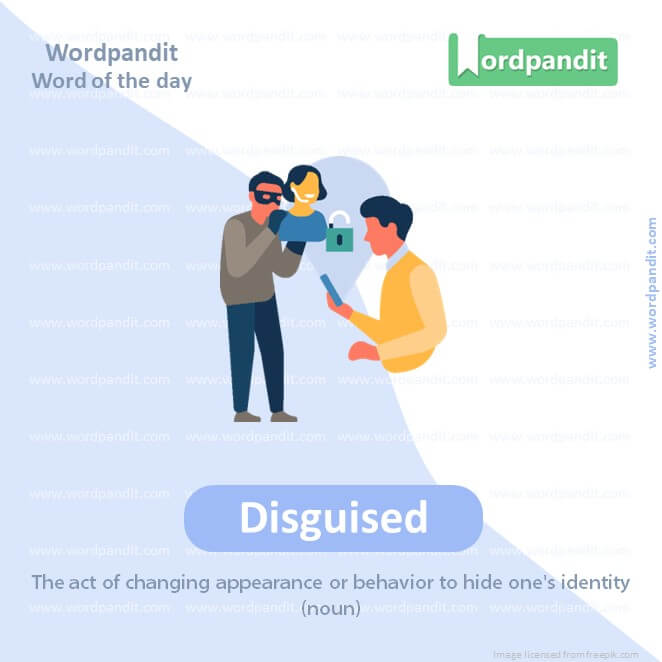
WORD-1: Disguised
CONTEXT: the Israeli prime minister launched a constitutional coup disguised thinly as “judicial reform”.
SOURCE: Guardian
EXPLANATORY PARAGRAPH: Imagine you’re playing dress-up and put on a costume to look like a superhero or a princess. When you’re disguised, it’s like playing dress-up so people don’t recognize you right away. You might wear a mask, special clothes, or even change your voice to hide who you really are.
MEANING: The act of changing appearance or behavior to hide one’s identity (noun); changing appearance or behavior to prevent recognition (verb).
PRONUNCIATION: dih-SGYZD
SYNONYMS: Camouflaged, Masked, Concealed, Hidden, Cloaked, Incognito
USAGE EXAMPLES:
1. She was disguised as a clown for the party.
2. The spy disguised himself to avoid being caught.
3. The entrance to the secret room was disguised as a bookshelf.
4. He disguised his voice during the phone call.
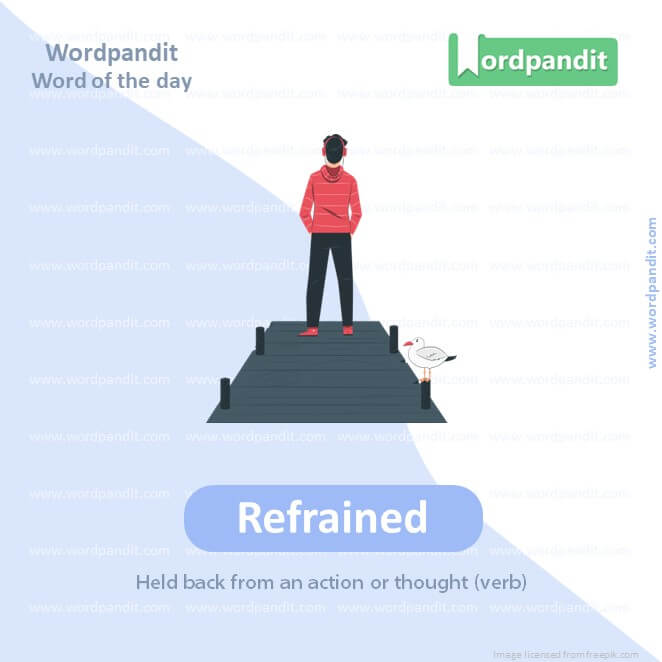
WORD-2: Refrained
CONTEXT: Biden publicly disapproved of Netanyahu’s authoritarian turn and noticeably refrained from inviting him to Washington during that period.
SOURCE: Guardian
EXPLANATORY PARAGRAPH: Refrained is like when you really want to eat another cookie, but decide not to. It means you stop yourself from doing something, even if you want to do it.
MEANING: Held back from an action or thought (verb).
PRONUNCIATION: ree-FRAYND
SYNONYMS: Abstained, Withheld, Desisted, Avoided, Ceased, Forebore
USAGE EXAMPLES:
1. She refrained from commenting during the argument.
2. He refrained from eating sweets during his diet.
3. Despite her anger, she refrained from yelling.
4. They refrained from making a decision until they had more information.
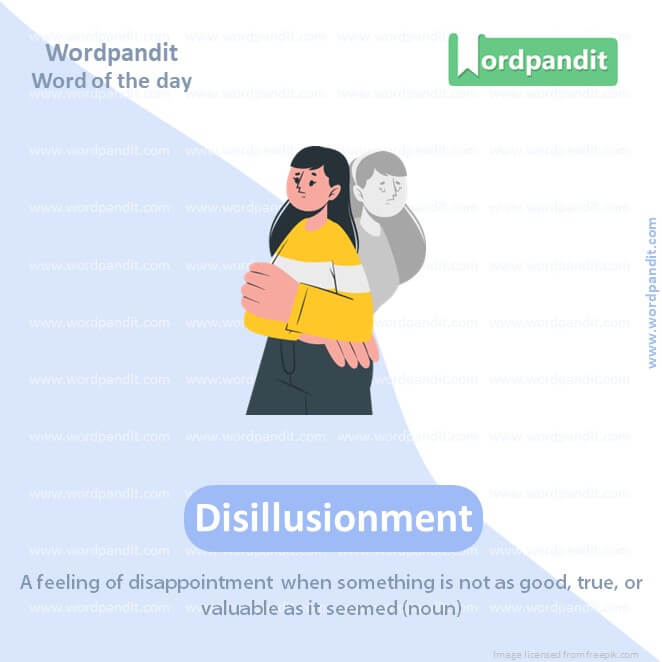
WORD-3: Disillusionment
CONTEXT: The reasons were many: its attainment of energy independence, fatigue and disillusionment with costly wars in Afghanistan and Iraq.
SOURCE: Guardian
EXPLANATORY PARAGRAPH: Disillusionment is when you believe something is really great, but then find out it’s not as good as you thought. It’s like thinking you’re getting a big ice cream, but then you only get a tiny one. You feel a bit sad or let down.
MEANING: A feeling of disappointment when something is not as good, true, or valuable as it seemed (noun).
PRONUNCIATION: dih-sih-loo-zhuhn-ment
SYNONYMS: Disappointment, Disenchantment, Letdown, Dismay, Discontent, Cynicism
USAGE EXAMPLES:
1. His disillusionment grew as he realized the truth.
2. The fans’ disillusionment was evident when the movie didn’t meet their expectations.
3. After years of work, she felt disillusionment with her career.
4. The book captures the disillusionment of the modern era.
WORD-4: Unwavering
CONTEXT: President Biden is beginning to pay a domestic political price for his unwavering support of Israel.
SOURCE: Guardian
EXPLANATORY PARAGRAPH: Unwavering is like being super strong and steady, even when things are tough. It’s like holding onto a kite really tightly on a windy day and not letting go, no matter how hard it pulls.
MEANING: Steady and not changing or wavering, especially in commitment or support (adjective).
PRONUNCIATION: uhn-WAY-vuh-ring
SYNONYMS: Steadfast, Resolute, Firm, Unyielding, Constant, Unfaltering
USAGE EXAMPLES:
1. Her unwavering support for her friend was admirable.
2. Despite the challenges, he remained unwavering in his goals.
3. She showed unwavering focus during the competition.
4. The leader’s unwavering determination inspired the team.
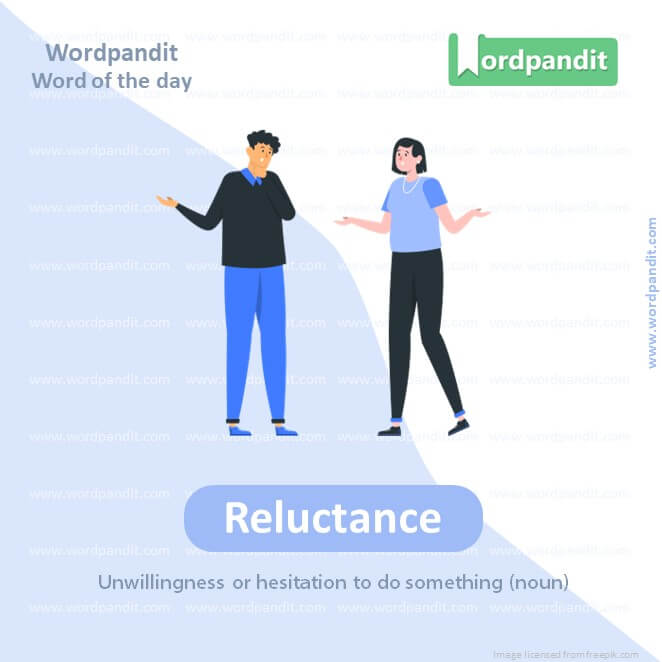
WORD-5: Reluctance
CONTEXT: As far as the Americans are concerned, Netanyahu’s reluctance to address the issue increases the likelihood of eventual escalation and reflects his cluelessness and indifference.
SOURCE: Guardian
EXPLANATORY PARAGRAPH: Reluctance is when you don’t really want to do something. It’s like when you don’t feel like cleaning your room, even though you know you should. You might do it, but you’re not happy about it.
MEANING: Unwillingness or hesitation to do something (noun).
PRONUNCIATION: ree-LUHK-tuhns
SYNONYMS: Hesitation, Unwillingness, Disinclination, Resistance, Aversion, Loathness
USAGE EXAMPLES:
1. There was a noticeable reluctance in his voice.
2. Despite her reluctance, she agreed to help.
3. His reluctance to join the team was clear.
4. She showed reluctance in accepting the new policy.
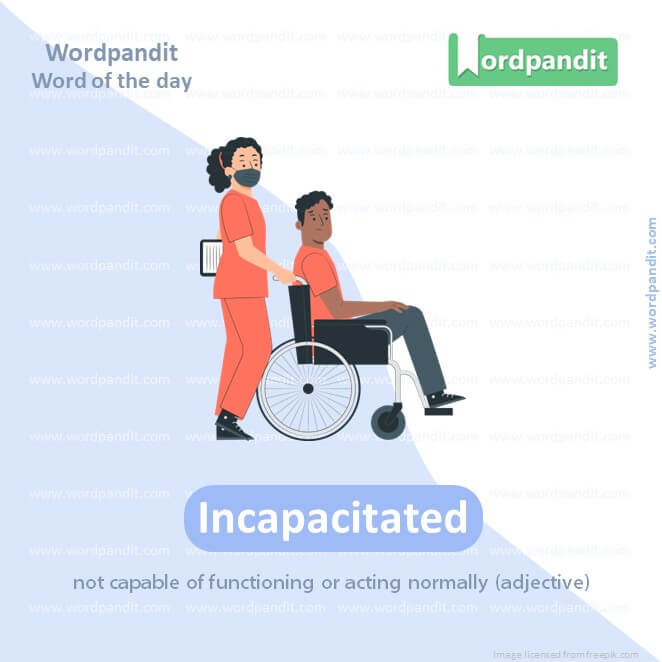
WORD-6: Incapacitated
CONTEXT: Hamas militarily and renders it politically incapacitated will be enough.
SOURCE: Guardian
EXPLANATORY PARAGRAPH: Incapacitated is like when your favorite toy runs out of batteries and can’t move or make sounds anymore. It means someone or something is not able to act or work properly.
MEANING: Made unable to function or act effectively (verb); not capable of functioning or acting normally (adjective).
PRONUNCIATION: in-kuh-PASS-ih-tay-ted
SYNONYMS: Disabled, Paralyzed, Debilitated, Powerless, Hamstrung, Helpless
USAGE EXAMPLES:
1. The injury incapacitated him for several weeks.
2. The system was incapacitated by the virus.
3. She was temporarily incapacitated by the illness.
4. The blizzard incapacitated the whole city.
WORD-7: Intractable
CONTEXT: Netanyahu is well aware of that, which makes balancing the pressure from home and from the US an intractable task.
SOURCE: Guardian
EXPLANATORY PARAGRAPH: Intractable is when something is really, really hard to deal with or change. It’s like trying to move a big rock that’s just too heavy to budge.
MEANING: Not easily managed, controlled, or solved (adjective).
PRONUNCIATION: in-TRAK-tuh-buhl
SYNONYMS: Stubborn, Unmanageable, Obstinate, Unyielding, Difficult, Uncontrollable
USAGE EXAMPLES:
1. The intractable problem took months to solve.
2. His intractable attitude made the negotiation difficult.
3. The disease was intractable and resisted treatment.
4. They faced an intractable challenge in the project.
WORD-8: Unravelling
CONTEXT: a champion for an American global hegemony that is now unravelling.
SOURCE: Guardian
EXPLANATORY PARAGRAPH: Unravelling is like when a sweater gets a loose thread and it starts to come apart. It means something is being untangled or understood better, or it’s starting to fall apart.
MEANING: Undoing twisted, knitted, or woven threads (verb); the process of something becoming clearer or undone (noun).
PRONUNCIATION: uhn-RAV-uh-ling
SYNONYMS: Untangling, Unfolding, Disentangling, Clarifying, Unweaving, Revealing
USAGE EXAMPLES:
1. The mystery was unravelling as they found more clues.
2. She spent hours unravelling the tangled yarn.
3. The plot of the story began unravelling in the second chapter.
4. His plan started unravelling due to unforeseen problems.
WORD-9: Imperialism
CONTEXT: He and his emulators gave to imperialism a new, post-colonial face, pursuing perceived national interest regardless of the costs.
SOURCE: Guardian
EXPLANATORY PARAGRAPH: Imperialism is when a country tries to control other countries, making them part of its empire. It’s like if someone tried to take over all the playgrounds and make them follow their rules.
MEANING: A policy of extending a country’s power and influence through colonization, use of military force, or other means (noun).
PRONUNCIATION: im-PEER-ee-uhl-iz-um
SYNONYMS: Domination, Expansionism, Colonization, Subjugation, Control, Sovereignty
USAGE EXAMPLES:
1. The history of imperialism includes many countries taking over others.
2. His book discusses the effects of imperialism on global politics.
3. The era was marked by European imperialism.
4. Anti-imperialism movements became prominent in the 20th century.
WORD-10: Pragmatism
CONTEXT: Putin is a student of Kissinger-ian pragmatism and realpolitik.
SOURCE: Guardian
EXPLANATORY PARAGRAPH: Pragmatism is like solving a puzzle by trying different pieces until you find the ones that fit. It means dealing with things in a practical way, focusing on what works best rather than just thinking or dreaming about it.
MEANING: A practical approach to problems and affairs (noun).
PRONUNCIATION: PRAG-muh-tiz-um
SYNONYMS: Practicality, Realism, Sensibleness, Effectiveness, Efficiency, Logic
USAGE EXAMPLES:
1. Her pragmatism helped the team find a realistic solution.
2. He was known for his pragmatism in business decisions.
3. The policy was based on pragmatism, not idealism.
4. Pragmatism is often essential in crisis management.
Vocabulary new Words
In the exuberant realm of language learning, nothing holds more thrill than the discovery of ‘vocabulary new words’. These gems of knowledge bring with them a fresh perspective and a deeper understanding of language. However, learning ‘vocabulary new words’ requires a methodical and focused approach.
The act of learning ‘vocabulary new words’ is a delve into linguistic novelty, often involving exposure to unfamiliar structures and meanings. Transcending the traditional approach of mere memorization helps in truly cementing newly learnt words into long-term memory. Interaction with a broad spectrum of written and spoken material, including novels, films, podcasts, and digital resources, provides a rich context of ‘vocabulary new words’ and significantly aids in their comprehension.
It’s noteworthy that unpacking ‘vocabulary new words’ is a steady process rather than a rushed one. A planned approach with a specific number of words, learned and reviewed each day, proves beneficial in effective learning. Coupling this method with technologies such as flashcards or memory-enhancement software can optimize the retention of ‘vocabulary new words’.
Integrating mnemonic devices and visual imagery is another highly efficient tool when learning ‘vocabulary new words’. Assigning unique stories or visuals to new words can enhance recall, making unfamiliar vocabulary much more approachable.
Lastly, practicing ‘vocabulary new words’ within daily routine is crucial for grasping their usage. Whether it’s through active utilization in conversation or incorporating these words in written communicative situations, application reinforces understanding.
In summation, mastering ‘vocabulary new words’ is an enriching pursuit that expands our linguistic horizons. However, a balanced approach, combining diverse reading materials, pacing your learning, employing memory-boosting strategies, and daily practice greatly streamlines the task. Embark on this fascinating journey, and let the ‘vocabulary new words’ fill your linguistic canvas with a fresh palette of expressions.











